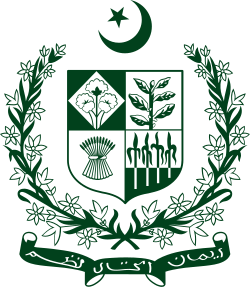 Seal of Government of Pakistan | |
| Agency overview | |
|---|---|
| Formed | August 14, 1947 |
| Jurisdiction | Government of Pakistan |
| Headquarters | Block A, Pakistan Secretariat-I, Constitution Avenue, Islamabad, Pakistan |
| Minister responsible |
|
| Agency executive |
|
| Parent department | Ministry of Energy |
| Website | Official Website |
The Power Division of the Ministry of Energy is an administrative and bureaucratic department to oversee the policy matters in electricity generation, grid transmission, and power distribution nationwide. The division was organized as a dedicated policy department with the inactivation of the Ministry of Water and Power in August 2017. [1]